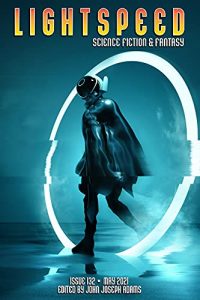Karen Burnham Reviews Short Fiction: Clarkesworld, Lightspeed, and BCS
 Clarkesworld 5/21
Clarkesworld 5/21
Lightspeed 5/21
Beneath Ceaseless Skies 4/22/21, 5/6/21
In May Clarkesworld starts off with a new David D. Levine story, always a treat. “Best Laid Plans” is a charming story about a modest space station run by a small university. Dr. Chelle Yan is studying how genetically modified mice (not allowed on Earth) transmit knowledge, but all that’s interrupted when the station starts leaking air, no one can find the hole to patch it, and they’re told they’ll need to evacuate – including either abandoning or euthanizing the animals. Dr. Yan locks herself in her lab behind a series of awesome obstacles to thwart the security and administrators, and starts working furiously to try to teach the mice repair skills. While I found it a bit of stretch that none of the on-board personnel could find the source of the leak given 24 hours, I absolutely loved the tale of the quirky but heroic researcher tackling a crisis. One researcher having much less fun is Sifan on the planet Wenshi in Bo Balder‘s story “The Force Exerted on the Mass of a Body“. Wenshi has gravity 2.8 times that of Earth, which is great for growing the experimental trees that Sifan believes can lead to a revolution in space travel, but sheer hell for a body used to one-G normal. Balder has worked out the details of that experience in thorough but not torturous detail, so we really feel Sifan’s exhaustion when she’s first contacted by Mx. Zhu, representing a Natural Preservation organization. Their remit extends even to the space environment, and it’s going to take a lot of evidence to persuade Sifan in her over-burdened state that there’s something about space travel that’s harming the environment of space-time itself.
Robert V.S. Redick brings us “Vanishing Point“, a tale with only a light speculative element that really focuses on two refugee children from a privileged family and fleeing violence. Their parents die of typhus on the seagoing ship journey to a country like Japan. One of their only mementos of their home country is a “morphocular” that both observes and changes the observed scene. We get a capsule of their whole lives – taken in by one of their father’s friends, the girl, Davka, falls into political rebellion and the boy, Jisan, becomes a musician and then a drug addict. There are family schisms and reunions. I almost think the story would be equally moving without any speculative element at all, but this story goes much deeper into character dynamics than most people are able to fit into the short form. The concluding story, “A Star for Every Word Unspoken” by Kai Hudson focuses on a very different family in a very different time. When we meet Na-Yeong, she has stolen a prototype light-speed-breaking space ship, and is jumping repeatedly, at great cost to herself, in search of… something. Interspersed with her jumps we learn about her history – as an autistic child her mother was her best (and sometimes only) advocate. Unfortunately there was an incident, and an estrangement, and then an accident, and her mother died much too early. Na-Yeong was able to follow in her mother’s footsteps and work on the same cutting-edge research project, which has led her to this point. What is she searching for, and what will happen when she finds it?
The science fiction section of Lightspeed in May features a very pointed story about cultural appropriation in space. “There Are No Hot Topics on Whukai” by Andrea Kriz is entirely different: Esko is a Whukian woman whom we first meet when a popular online multiplayer game cracks down on Whukians “gold farming” (intensively focusing on extracting virtual resources that they can then sell to lazier, richer players). She needs to find another gig, and ends up being the rent-a-Whukain-friend to a popular fanfic writer, xXButterflyDragonEmpressQueenXx, usually referred to as the Author. Esko even ends up writing certain passages of the Author’ epic saga for her. It turns out that Whukai is a heavily colonized planet, and the Author engages in some wholesale appropriation, using Esko as a source. When Esko finally calls her on it the flat-out racism emerges, and Esko has to decide how to handle it. But Esko has more power in this situation than the Author probably realizes.
In the fantasy section, we get stories that draw from Middle Eastern and Russian folklore respectively. “The Palace in the Moonlight” by Howard Andrew Jones has an Arabian Nights feel to it as Dabir and Asim, representatives of the caliph, are sent to find the titular Palace. (Dabir and Asim can also be found in Jones’s larger Chronicle of Sword and Sand universe of novels.) They locate the fantastic Palace, and are even lucky enough to find a translator who helps them convey the respect and gifts of the caliph to the Queen of Sheba. There is more to the palace, to the translator, and everything about it than meets the eye, and it will take all their wits to escape this particular trap. For “Bones in It” by Kristina Ten, we get the story of a vedma (a monstrous creature of Russian legends) – or rather the story of the banya (Russian spa) in suburban Chicago where she resides. The original owners, Pavel and Masha, recognized her immediately and gave her a comfortable life in a perpetually out-of-order spa room with regular meals of good meaty stew in exchange for promoting the banya’s prosperity. When the owners tragically and suddenly pass away, their adult kids sell the banya to a couple who want to make it trendy: the B*Well Banya full-service day spa with an all-vegan menu. They don’t know about the vedma or why one particular room was marked “out of order.” It’s not too much of a mystery where this is headed, and Ten does us the favor of drawing up a loathsome creative writing professor who will be the first to cross paths with a very hungry monster. Funny, satisfying, and just the right length.
Beneath Ceaseless Skies #328 starts with an almost surreal take on a world’s future. “A Stranger Goes Ashore” by Adam R. Shannon starts with Alain returning from a long voyage, out searching for a new island that the Company (i.e. the rich) can colonize. We see that Heora, these people’s home island, is decaying drastically year by year. As Alain relates his story to a Company official, we learn that most islands in this world are completely inhospitable to life – or at least to most life. There may be some people, matched with some islands, who can live a very different kind of existence. This puts everything the Company thought they were doing, as corrupt as it was, in grave doubt. I felt like the story allowed me to draw some thoughtful parallels with our possible futures in space. “Traces” by A.E. Decker is the lovely if tragic story of Chaser, a servant of a Master who has taken almost all his memories, including his name. The Master keeps them in a small box in his coat, and Chaser’s job is to find things the Master wants, be they treasures or beautiful women. That’s how he meets a woman running away, who hasn’t yet lost her name. While she must return to the Master they begin conspiring together to see if they can escape with Chaser’s memories intact. The style of the writing and the description of the liminal land is beautiful, and I appreciated that the ending pushed Chaser’s story farther than where the climax might have stopped.
Beneath Ceaseless Skies #329 brings us a new Marie Brennan story, “Oak Apple Night“. In this fairly short story Joan is taken by her grandfather to the oak tree where the Catholic king (readers may recognize the story of England’s King Charles II) had to hide from Cromwell’s Roundheads. There is pride in the family story, since they helped save the king, but sorrow that the dignity of the kingship itself was demeaned and hasn’t yet been restored. At midnight Joan sees a perfect stag, the embodiment of everything that could be right and noble about a kingly leader, exit through a portal in the oak. Her interpretation of events, and her words to the stag, are likely not at all what her snoozing grandfather would have thought. Jonathan Edelstein brings us another historical setting in “The City of Kindness“. In Taifa of Tuluz (on the Iberian peninsula) in 1194, Isaac the Blind is contacted by his friend Mansour to try to find a Christian student who has been kidnapped and has not been heard from in days. Using his understanding of Kabbalah, Isaac is able to find the young man, who has been possessed by a dybbuk, the tortured soul of a Jewish man from York (England) who had been forced to kill his own daughters and himself when the Christian community closed in on their temple. The dybbuk believes he has a path to revenge, and it will take the combined efforts of Judaism, Islam, Christianity, and some witchcraft to resolve this situation in a way that won’t result in a similar tragedy overcoming the Jews of Tuluz.
Recommended Stories
“Oak Apple Night”, Marie Brennan (Beneath Ceaseless Skies 5/6/21)
“Traces”, A.E. Decker (Beneath Ceaseless Skies #328)
“A Star for Every Word Unspoken”, Kai Hudson (Clarkesworld 5/21)
“Best Laid Plans”, David D. Levine (Clarkesworld 5/21)
Karen Burnham is an electromagnetics engineer by way of vocation, and a book reviewer/critic by way of avocation. She has worked on NASA projects including the Dream Chaser spacecraft and currently works in the automotive industry in Michigan. She has reviewed for venues such as Locus Magazine, NYRSF, Strange Horizons, SFSignal.com, and Cascadia Subduction Zone. She has produced podcasts for Locusmag.com and SFSignal.com, especially SF Crossing the Gulf with Karen Lord. Her book on Greg Egan came out from University of Illinois Press in 2014, and she has twice been nominated in the Best Non-Fiction category of the British SF Awards.
This review and more like it in the July 2021 issue of Locus.
 While you are here, please take a moment to support Locus with a one-time or recurring donation. We rely on reader donations to keep the magazine and site going, and would like to keep the site paywall free, but WE NEED YOUR FINANCIAL SUPPORT to continue quality coverage of the science fiction and fantasy field.
While you are here, please take a moment to support Locus with a one-time or recurring donation. We rely on reader donations to keep the magazine and site going, and would like to keep the site paywall free, but WE NEED YOUR FINANCIAL SUPPORT to continue quality coverage of the science fiction and fantasy field.
©Locus Magazine. Copyrighted material may not be republished without permission of LSFF.








Thank you for the nice review. I’m so happy you liked my story. Actually, thank you for all the reviews.
They are thoughtful and nuanced, and it’s a lot of work to read so many pieces.